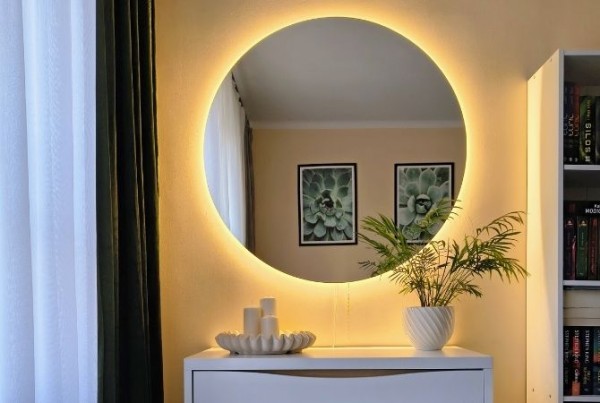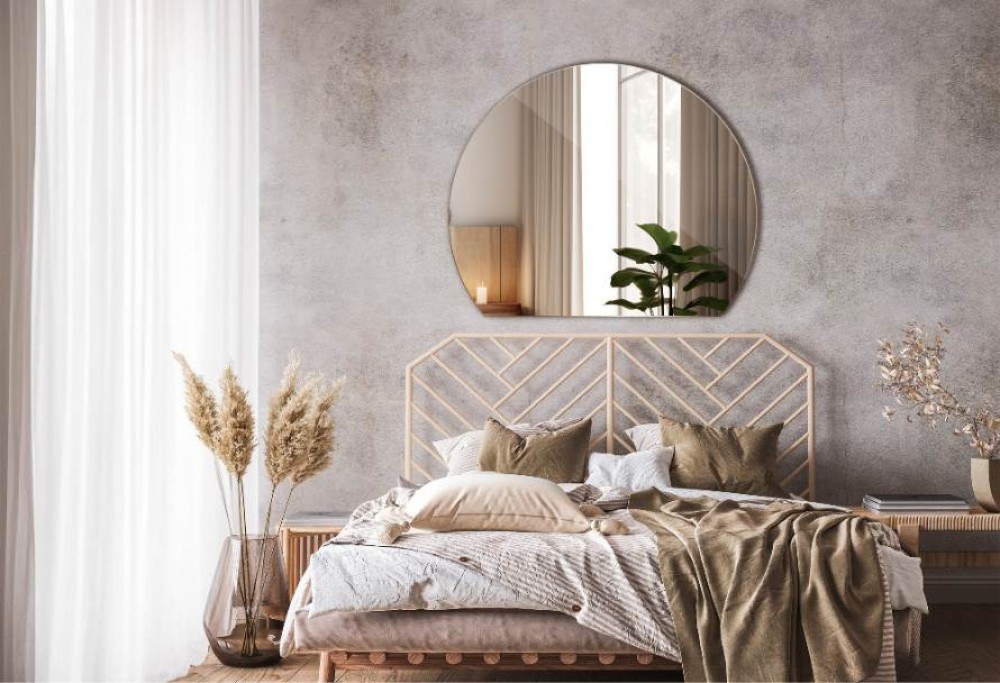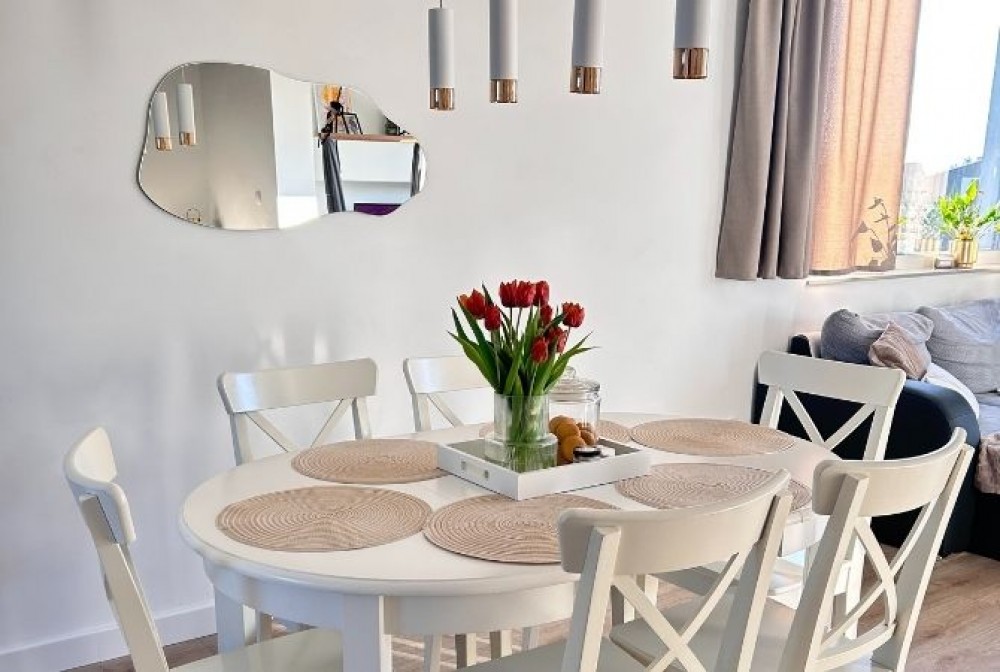Which makeup mirror?
In this step-by-step guide, we will show you how to choose a mirror that will meet your needs, match the style of the interior and help you achieve the perfect effect without compromise.

Mirrors are not just tools for looking at oneself - their ability to reflect light, visually enlarge spaces, and attract positive energy makes them particularly important in interior design. However, not every mirror placed in a room brings benefits. There are locations where mirrors should not be hung - both for practical reasons and according to feng shui principles. In this article, you will learn not only tips on where not to hang mirrors but also how their proper placement can influence natural light, the sense of spaciousness, and the positive energy of the interior.
One of the most common mistakes in interior design is hanging a mirror opposite the entrance door. Although it may seem that placing a mirror in this way will visually enlarge the hallway, feng shui practice warns against this solution. According to feng shui principles, mirrors should not reflect entrance doors because the energy (chi) flowing into the house is immediately reflected and "thrown" back outside.
A mirror hung in such a spot can disrupt the home's energy balance and attract negative energy instead of positive. The reflection of doors, guests, or passing household members introduces unease and chaos instead of calmness and harmony.
Instead, choose a mirror on the side of the hallway - so that it reflects natural light, a decorative element, or a stylishly arranged space. In such a location, a mirror placed according to feng shui can attract positive energy while also serving a practical function and visually enlarging the space.
The bedroom is a space dedicated to relaxation, regeneration, and rest. Hanging a mirror opposite the bed, however, can negatively impact these functions - both from a psychological comfort perspective and according to feng shui principles. The reflection of your body while sleeping, as well as movements in the room, can cause feelings of unease and tension, especially at night.
Feng shui treats mirrors in the bedroom with great caution. Mirrors reflect not only light but also energy - which is why their presence opposite the bed can amplify stress, disrupt sleep, and create disharmony. A mirror placed in such a spot does not allow energy to circulate calmly around the bed - which is crucial for maintaining balance and resting well.

If you want a mirror in the bedroom, choose a mirror with a stylish frame and place it in a way that does not reflect the bed. It can be hung above a dresser or in a spot where it serves a practical purpose, e.g., for getting ready in the morning. You might also consider choosing a mirror with sliding doors in a wardrobe - which can be closed at night. This is a compromise between aesthetics and feng shui harmony.
Narrow hallways often tempt people to hang mirrors to visually enlarge the space. While using mirrors can indeed create the effect of a "double-sized" room, hanging a large mirror at the end of a hallway can create an unpleasant tunnel effect. Such a decorative mirror can disrupt the proportions of the interior and cause feelings of claustrophobia.
According to feng shui principles, mirrors placed at the end of a long, narrow hallway can block the flow of energy. Instead of attracting positive energy, they cause it to stop and reflect chaotically. A mirror hung in such a spot additionally amplifies the elongation effect - which does not always work to the advantage of interior design.
If you want to introduce a mirror into the hallway, ensure it reflects natural light from adjacent rooms or a decorative element, not another door. When choosing a hallway mirror, opt for a model with a delicate frame and a rounded shape - this avoids sharp lines that amplify unease.
Although mirrors are increasingly appearing in modern kitchen designs, it is worth carefully considering their placement. One of the places where mirrors should not be hung is the space right next to the stove, oven, or other heat sources. Why? Primarily for practical reasons - a mirror placed in such a location quickly gets dirty, becomes dull, and is challenging to clean.
Additionally, according to feng shui practice, fire symbolizes intense energy, which a mirror can reflect too strongly, amplifying unwanted tensions in the home. A mirror reflecting boiling pots, hot flames, or intense oven lights can create energetic chaos instead of attracting positive energy.

If you want to introduce a mirrored space into the kitchen, choose a decorative mirror in a neutral frame and hang it in a spot that does not come into contact with steam or grease - e.g., above the countertop, next to the dining area, or in a transitional space. A good idea might also be mirrored glass as part of the cabinetry - but only in places not exposed to intense heat.
The bathroom is another place where the use of mirrors must be well thought out. Although mirrors are essential here and serve an important practical function, avoid situations where the mirror is placed opposite the toilet. A mirror hung in such a spot can reflect unsightly views and cause discomfort for bathroom users.
From a feng shui perspective, mirrors should not reflect elements associated with elimination, as this symbolizes the removal of energy. The reflection of a toilet in a mirror can therefore signify the "flowing away" of prosperity or health from your home. Moreover, frequently looking at such a reflection while using the bathroom can negatively impact the mood and overall atmosphere of the space.
Instead, choose a mirror that reflects natural light, stylish tiles, decorative bathroom elements, or greenery from plants. The mirror frame can have decorative details - in a glamorous or minimalist style, depending on your bathroom's design. Remember: properly placed mirrors have not only a decorative impact but also an energetic one - so every detail matters.
A mirror is more than just a glass pane hanging on the wall - it is a decorative element that can bring light, depth, and energy into your home. However, its power lies not only in its appearance but also in its skillful placement. When choosing a mirror, remember that its presence affects the mood of the household and the soul of the interior.
Let your mirrors reflect what is beautiful: harmony, natural light, decorative details, and not random doors or undesirable corners of a room. In a world full of reflections, it is worth consciously creating a space that not only looks good but also feels good to live in.
In this step-by-step guide, we will show you how to choose a mirror that will meet your needs, match the style of the interior and help you achieve the perfect effect without compromise.
Two mirrors in the bathroom are not only a trend, but also a functional solution. Check when they work, how to choose them and how to avoid arrangement mistakes.